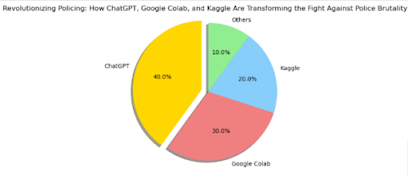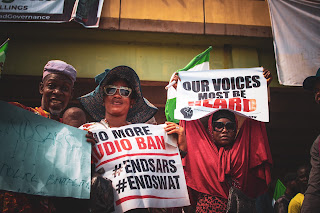How artificial intelligence may help reduce global police brutality
Artificial intelligence (AI) has the potential to revolutionize many industries, including law enforcement. One area where AI could have a significant impact is in eliminating police brutality around the world. In this blog post, we will explore how AI can be used to prevent and address police brutality and the challenges that must be overcome to make this a reality.
First, it's important to understand what police brutality is and why it's a problem. Police brutality refers to the excessive or unjustified use of force by law enforcement officers. This can include physical violence, verbal abuse, and other forms of misconduct. Police brutality is a serious problem in many countries and can lead to loss of life, injury, and damage to communities.
One way that AI can be used to address police brutality is through the use of body-worn cameras. These cameras are worn by officers and record their interactions with the public. AI can be used to analyze the footage and flag any instances of excessive force or misconduct. This can help to identify officers who are engaging in brutal behavior and provide evidence for disciplinary action.
Another way that AI can be used to prevent police brutality is through the use of predictive analytics. This involves using data to identify patterns and trends that may indicate a potential for police brutality. For example, data on officer complaints, use of force incidents, and demographic information can be analyzed to identify officers or areas where there may be a higher risk of police brutality. This information can then be used to focus training and other efforts to reduce the chance of police brutality.
AI can also be used to improve officer training and decision-making. For example, virtual reality simulations can be used to train officers on how to handle difficult situations, such as dealing with individuals with mental health issues. AI can also be used to analyze data on past incidents to identify best practices for handling different types of situations. This can help officers make better decisions in the field and reduce the risk of police brutality.
While the use of AI in policing has the potential to significantly reduce police brutality, there are also challenges that must be overcome. One of the biggest challenges is ensuring that the AI systems are fair and unbiased. This is especially important when it comes to policing because AI systems that are biased against certain groups can make the problems that already exist worse and lead to even more brutality by the police.
Another challenge is ensuring that AI systems are transparent and accountable. AI systems that are used in policing must be able to explain their decisions and provide a clear audit trail. This is important to ensure that the systems are not being used to justify the unjustified use of force.
Finally, it's important to recognize that AI is not a magic solution to police brutality. While AI can be used to help prevent and address police brutality, it's just one of many tools that must be used in conjunction with other strategies. This includes making changes to the criminal justice system, the way police work, and how they interact with the community.
In conclusion, AI has the potential to make a significant impact on ending police brutality worldwide. By using AI to analyze body-worn camera footage, identify patterns and trends, and improve officer training, we can reduce the risk of police brutality and create a safer and more just society for all. However, it's important to ensure that the use of AI in policing is fair, transparent, and accountable and that it's used in conjunction with other strategies.




Comments
Post a Comment